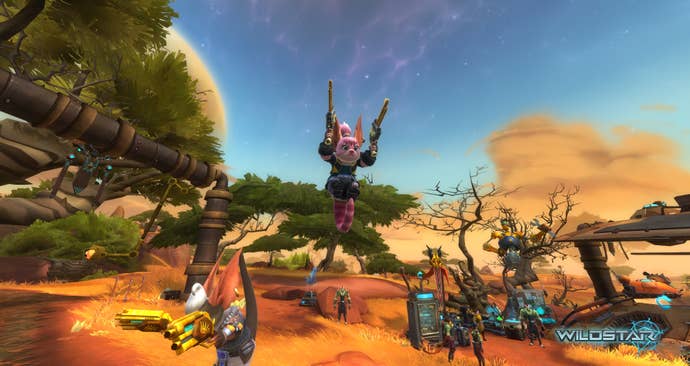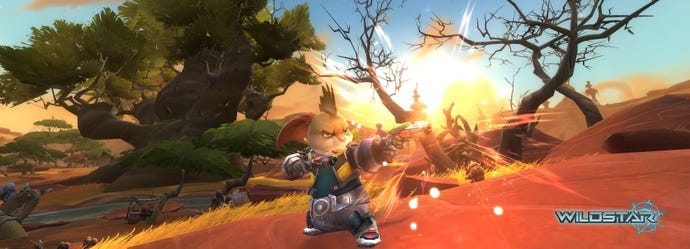Pay to Play: In Defense of MMORPG Subscription Fees
Upcoming MMOs WildStar, The Elder Scrolls Online and Final Fantasy XIV have all opted for the old-school subscription-based model. Wisdom or folly?
This article first appeared on USgamer, a partner publication of VG247. Some content, such as this article, has been migrated to VG247 for posterity after USgamer's closure - but it has not been edited or further vetted by the VG247 team.
There's interesting times ahead for the massively multiplayer online role-playing game -- a genre which many have assumed to be on the decline as fresh-faced upstarts like MOBAs attempt to dethrone it.
But while it may indeed be on the decline in favor of games a bit more friendly to casual and/or sporadic play, it's a little early to start making funeral arrangements just yet. The free-to-play MMORPG market is flourishing -- particularly since Steam has made free-to-play games a permanent section of its catalog -- and a number of the "old guard" are still hanging in there. Not only that, but games such as Guild Wars 2 and The Secret World, both of which offer an experience in a strange middle ground between free-to-play and old-school subscription-based, are doing well -- Guild Wars 2 particularly, which was recently claimed to be the fastest-selling Western MMO of all time.
While many people seem keen to leave the subscription model in their rear-view mirrors -- "I'll wait for it to go free-to-play" is the war cry of many a prospective player upon the release of a new MMO -- that doesn't mean developers and publishers have abandoned the business model altogether. Indeed, in the coming months there are three separate massively multiplayer games coming from three different companies, all of which are making use of the traditional "buy a copy, then pay per month" subscription model: Final Fantasy XIV from Square Enix, WildStar from NCSoft, and The Elder Scrolls Online from Bethesda, which our man Mike discussed yesterday.
Surely they're all mad, right?

Actually, no; I'm really quite happy to see the subscription-based model continuing undeterred. Plenty of you may disagree -- and I'm sure you will in the comments -- but I, for one, am firmly in favor of these games not only launching with a subscription fee attached, but sticking to their guns and maintaining it.
Of the three, Square Enix is least likely to cave in to pressure and make Final Fantasy XIV free-to-play, since its venerable MMO Final Fantasy XI remains steadfastly subscription-based after 11 years of service and still enjoys an active player community. Final Fantasy XI even charges for extra character slots and expansions on top of its base subscription fee, though if you buy a new copy today you'll generally get everything included for a very reasonable price, leaving you with just the subscription to worry about. Final Fantasy XIV is a little more reasonably priced than its predecessor; its base subscription plan of $12.99 per month allows a total of eight characters (up to one per server), while the next tier up costs $14.99 and allows up to eight characters per server up to a maximum of 40 in total.
WildStar is taking an interesting approach somewhat similar to how EVE Online handles subscriptions. Specifically, you'll be able to pay your monthly fees for the game using in-game currency. This is an eminently sensible idea that benefits everyone involved -- by allowing this as an option, NCSoft ensures that it keeps its active player numbers up as people log in frequently to earn enough money to fund each month of play; at the same time, said players feel like they're "beating the system" by earning something that "should" cost money through simply playing the game. It remains to be seen how well-balanced the system is, but EVE Online has been happily operating like this for quite some time now, so there's no reason WildStar can't do the same.
As for The Elder Scrolls Online, I won't go over the same ground Mike did yesterday, but I will highlight one particular quote that jumped out at me:
"Players will appreciate not having to worry about being 'monetized' in the middle of playing the game, which is definitely a problem that is cropping up more and more in online gaming these days. The fact that the word 'monetized' exists points to the heart of the issue for us: We don't want the player to worry about which parts of the game to pay for -- with our system, they get it all."
Matt Firor, ZeniMax Online general manager.
I can't tell you how happy reading this quote made me. As I've noted a couple of times in previous articles, my past life between the dissolution of GamePro (may it rest in peace) and the formation of USgamer was spent reviewing mobile and social games for an industry-facing publication. This meant delving deep into various Facebook and mobile games' monetization strategies, and, as if you don't know this already, certain quarters of the free-to-play market go beyond "shady" into "outright despicable." Consider, if you will, this white paper published on Gamasutra a while back, in which we were all introduced to the concept of "fun pain" -- a game deliberately putting obstacles in the path of the player, and inviting them to remove these inconveniences by reaching for their credit card. Or, from the same paper, the idea that games such as King.com's odious Candy Crush Saga slowly, subtly and almost imperceptibly move from being games of skill to games of luck the further into them you go, thereby ensuring that you're well and truly addicted by the time it becomes all but necessary to start spending money to progress.
Naturally, the mobile and social game markets don't represent everyone doing free-to-play, and in fact there are a number of games -- particularly on PC -- that implement it very fairly: League of Legends, Team Fortress 2, Dota 2, Star Trek Online, World of Tanks, Lord of the Rings Online and many more besides. However, having seen the very worst that the business model has to offer, I'm now much more wary of it whenever it's used, because I'm always conscious that these games have got to make their money somehow -- they're unsustainable if they're too generous. Where do they start implementing "fun pain," if at all? Am I really getting an optimal experience if I don't pay anything? Once I start paying, where does it stop? Where's the line between "minnow" and "whale" -- the latter being the obnoxious, disrespectful term used by free-to-play specialists to describe those players who spend a significant amount of money per month?
There's also the fact that MMORPGs tend to pride themselves on their immersion -- the idea of being who you want to be in a fantasy world -- and I find that completely at odds with the idea of spending real money on in-game items, whether those are cosmetic items or consumable boosters. (That said, I actually don't have a huge problem with purchasable customization items; it's consumables that I find somewhat more objectionable.) I would much rather have a predictable amount of money leave my account per month and know that money is going towards helping the game keep running and/or adding more content on a regular basis. This may even mean that I end up spending more money in the long run than I would on a free-to-play game, but I'm fine with that; at least I know that the game will be designed and balanced in such a way that no-one can "pay to win" or buy an advantage over other players.

The key thing that Square Enix, NCSoft and Bethesda need to do with these subscription games is ensure that they're regularly updated with new content and incentives for people to keep playing, particularly in the light of Guild Wars 2 pretty much providing the old-school MMO experience without a subscription fee. (That said, Guild Wars 2 runs like crap on my computer while FFXIV runs like a dream, so that's an easy decision for me.)
In other words: so long as there's new content added each month, helping players to feel like their $15 is actually paying for something worthwhile besides just keeping the servers turned on -- though that's important in itself! -- these games will be able to maintain their player bases without growing demands for them to go free-to-play. It doesn't have to be substantial content like new dungeons or zones, either; just things like special events, new outfits, new items or rare monsters can be enough to keep things interesting between larger expansions. So long as the players feel they're getting a good experience and aren't being cheated out of their money each month, there's still a place for the subscription-based model in today's gaming landscape.
This is how I feel, anyway. As I noted earlier, I'm almost certain there'll be at least a few of you out there who feel differently and that's absolutely fine, too; I'm just glad that developer and publishers are seemingly acknowledging that when it comes to games like this, one size doesn't necessarily suit everyone.
